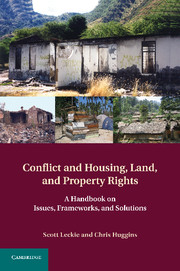Book contents
- Frontmatter
- Contents
- Opening Note and Acknowledgments
- Foreword by Dan Lewis
- 1 Introduction to the Issues – HLP Rights and Sustainable Peace
- 2 The International HLP Rights Normative Framework
- 3 Displacement, Conflict, and HLP Rights
- 4 HLP Restitution Rights
- 5 Restitution Mechanisms and Institutional Frameworks
- 6 United Nations and Other Peace Operations and HLP Rights
- 7 Protracted Displacement and Political Obstacles to the Protection of HLP Rights
- 8 Emerging Conceptual Issues
- 9 Improving International Responses to HLP Rights and Conflict
- Index
- References
2 - The International HLP Rights Normative Framework
Published online by Cambridge University Press: 03 May 2011
- Frontmatter
- Contents
- Opening Note and Acknowledgments
- Foreword by Dan Lewis
- 1 Introduction to the Issues – HLP Rights and Sustainable Peace
- 2 The International HLP Rights Normative Framework
- 3 Displacement, Conflict, and HLP Rights
- 4 HLP Restitution Rights
- 5 Restitution Mechanisms and Institutional Frameworks
- 6 United Nations and Other Peace Operations and HLP Rights
- 7 Protracted Displacement and Political Obstacles to the Protection of HLP Rights
- 8 Emerging Conceptual Issues
- 9 Improving International Responses to HLP Rights and Conflict
- Index
- References
Summary
As Chapter 1 outlined, conflict and abuses of housing, land, and property (HLP) rights are virtually synonymous with one another. Every conflict, no matter how small, short-lived, or isolated will invariably involve violations of HLP rights. Before examining how such rights might best be enforced and protected in later chapters of this book, this chapter looks closely at the numerous international legal sources of HLP rights, their content and origins.
THE RIGHT TO HOUSING UNDER INTERNATIONAL LAW
The recognition of housing, land, and property rights by the United Nations began immediately following the creation of the organization itself, in the 1948 Universal Declaration of Human Rights, which included the right to housing and the right to property. Since then, HLP rights have been recognized in a series of international human rights treaties, declarations, and other documents.
Of the various manifestations of HLP rights recognized under international human rights law, the International Convention on Economic, Social and Cultural Rights contains the most comprehensive and significant international legal source of the right to housing. Article 11(1) provides:
The States Parties to the present Covenant recognize the right of everyone to an adequate standard of living for himself and his family, including adequate … housing, and to the continuous improvement of living conditions. The States Parties will take appropriate steps to ensure the realisation of this right, recognising to this effect the essential importance of international cooperation based on free consent.
- Type
- Chapter
- Information
- Conflict and Housing, Land and Property RightsA Handbook on Issues, Frameworks and Solutions, pp. 53 - 91Publisher: Cambridge University PressPrint publication year: 2011

